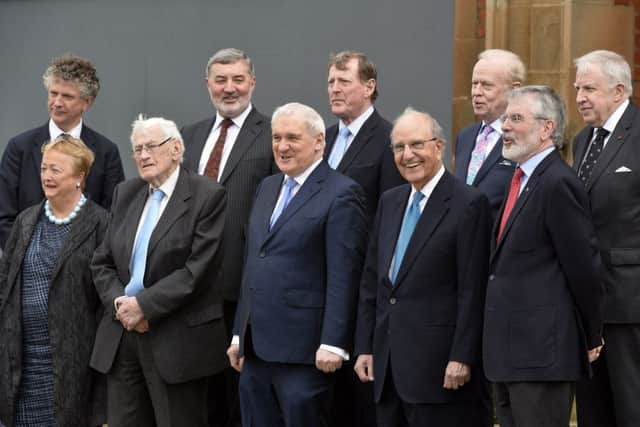Alex Kane: Sadly, I can see few reasons to be cheerful for our future


It’s actually a good question, because it sums up how many people outside Northern Ireland (including a good many in the South) view the place. They genuinely don’t understand why, if the violence has stopped, the political process and societal integration seems as stuck-in-the-mud as ever.
The primary difficulty, I think, lies in the fact that – unlike South Africa, for example – there is no agreement on the constitutional future of Northern Ireland. In essence, what we have is a stalemate; a sort of arithmetic waiting game; a limbo where not much can really happen because the key players on both sides are too busy watching and counting the electoral/census/opinion poll figures. So why bother to try and build a stable, consensual relationship when the main parties of unionism and nationalism (representing about 85% of those who vote) accept that it could change at almost any time?
Advertisement
Hide AdAdvertisement
Hide AdHad new political/electoral vehicles emerged over the last two decades, offering alternatives to the same-old, same-old and biting huge chunks out of the established us-and-them parties, then it would have changed the dynamics. But they haven’t; and they didn’t. Nor is there much evidence that people who were 16-18 in April 1998 (and they will now be nudging 40, probably with careers, mortgages and children) are voting all that differently from their parents. Generally speaking – and it isn’t an exact science, of course – they are either opting out and not voting, or else voting for the us-and-them parties.


In fairness, quite a few people do tell me, “These parties don’t represent me. What’s happening, or not happening, in Stormont, is not what I want. I’m not interested in unionist/nationalist politics. And I know I’m not alone.” Yada yada. If you really think you’re not alone then get off your arses, get off social media and start knocking doors. You want something different to vote for? Then get out there and build it. You want something different to vote for? Fine, then be the something different you want to vote for. Don’t blame the DUP and Sinn Fein for increasing their vote: in politics that’s known as getting your message to the right people.
But here’s a problem (and it applies to both old and new parties): how do you build a new, collective, consensual future when two huge swathes of the electorate don’t agree on the constitutional future? And here’s another problem: if you’re not making plans for a long-term collective future then how do you come to terms with our collective past? You can’t. You don’t. Why would you even bother to understand our collective past when you have no interest in working with the ‘other side’ towards the same end political/constitutional/societal goals?
Instead, we focus on ourselves and promote our own narrative – our own version of events – entirely to our own side. Seeing the other side’s point of view is regarded as a weakness; walking around in our neighbour’s backyard, looking at our house from his perspective (the Atticus Finch approach) is dismissed as an admission that we think his criticism of us might possibly be justified.
Advertisement
Hide AdAdvertisement
Hide AdEven asking the question, “Why do they seem to hate us?” is brushed off with the sweeping assertion that their hatred is inbred because they are force-fed indoctrination and propaganda from the womb to the tomb. The occasional – and it is only occasional – admission that we might have done something wrong along the way is followed quickly by an enormous ‘BUT that’s because ...’
In some other post-conflict, coming-out-of-conflict zones, a day like April 10, 1998 would by now have become a public holiday. Political and civic leaders would come together to wave and smile during huge public commemorations and celebrations. The surviving negotiators of the Good Friday Agreement would be feted – by both sides – as heroes. A new generation of leaders would be building on from earlier successes. We would have come to grips with our past and learned from the mistakes.
But not here. For the third April 10 in a row there will be no Assembly and no Executive. The largest crowd discernible is the increasingly large one made up of people waiting on a hospital list for a first, let alone a follow-up appointment. And in this particular instance the leaders of both sides should be ashamed of themselves, because the problem predates the latest DUP/SF stand-off.
Cancer doesn’t give a damn if you’re unionist or nationalist. It isn’t just one side or the other which needs an X-ray, or a hospital bed, or a new hip, or a triple bypass. Tens of thousands of people are being let down every day because the parties can’t even get their act together on health: a department which has had both unionist and nationalist ministers in charge.
Advertisement
Hide AdAdvertisement
Hide AdPeople tell me I’m wrong to have ‘given up’ on the 1998/2007 agreements ever working. But that’s my conclusion. We can’t agree on reconciliation. We can’t agree on the future. We can’t agree on the past. We can’t agree on what constitutes a priority. We don’t trust each other. No one has produced a successful alternative to the existing parties.
Generally speaking we continue to vote as we have always voted. We live in our own areas. We avoid difficult conversations if we find ourselves in ‘mixed’ company across a dinner table. Our schools tend to remain segregated, although some pretend that ‘shared’ is the same as ‘integrated’. I could keep adding to this list. I see very little reason to be cheerful about the future. Indeed I fear, I really do, that it will become very much worse.